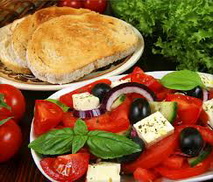The Healthiest Foods Of The Mediterranean Diet
![]()

The Mediterranean diet is not any specific diet plan, but more a way of eating. This is an eating plan that you can adopt for the rest of your life. It is based on the daily diet of people who live in the countries surrounding the Mediterranean Sea, especially Southern Italy and Crete. These individuals typically have lower rates of chronic diseases and longer life spans than people in other countries.
The Mediterranean diet includes lots of fresh vegetables and fruits, fresh fish, legumes, olive oil and nuts. Olive oil is the primary source of fat in this diet. Most meals will also include a bit of red wine as accompaniment. Following the Mediterranean diet is believed to lower risk of disease, including obesity, heart disease, Alzheimer’s disease, certain cancers, and type 2 diabetes.
The Mediterranean diet is based on a variety of delicious and health foods. There are 21 countries bordering the Mediterranean Sea, including Israel, Greece, France, Lebanon, Italy, Turkey, Sicily, Spain, and Morocco. The diet depends upon preparing foods from scratch which optimizes the medicinal and health benefits. There are some foods considered the healthiest of the Mediterranean diet.
Lamb
Lamb is one of the primary protein sources of the Mediterranean diet. Lamb is sheep which are less than a year old. More than a year and the meat is called mutton. Lamb contains iron, vitamin B, tryptophan, protein, and zinc. If the lamb is grass fed, it contains more Omega-3. Some use lamb tallow as cooking oil and lamb bones contain large amounts of gelatin. These may be stewed with barley to create a broth called Scotch Broth.
Sesame
Sesame, typically found in seeds contains an unsaturated essential Omega-6 fatty acid, linoleic acid. Sesame also contains vitamins E and B3, as well as protein and folic acid. These seeds are native to Africa and often made into tahini, a paste used in various Mediterranean diet dishes.
Wheat Bulgur
Bulgur is a form of wheat which is debranned and parboiled. It should not be confused with crushed wheat berries or cracked wheat. Wheat contains vitamins B3, B2, and B1, as well as iron, manganese, magnesium, tryptophan, and fiber. Bulgur is high in fiber, low in fat, and contains protein. It is used a primary ingredient in tabouli.
Pine nuts
Pine trees have seeds called pine nuts. These contain vitamins A, C, and D, as well as the essential fatty acid alpha-linoleic acid. These seeds or pine nuts also contain fiber and protein and help to improve your health. They seems to have a beneficial effect on cardiovascular health, boost the immune system, strengthen bones and teeth, help the body absorb other beneficial nutrients, and sharpen vision. Pine nuts are used as a primary ingredient in pesto.
Garbanzo beans
These beans, also called chick peas contain copper, folate, fiber, tryptophan, iron, molybdenum, phosphorous, manganese, and protein. Garbanzo beans are a legume which originated in the Middle East. They seem to help balance blood sugar levels and lower cholesterol. They also contain natural sulfites which possess detoxifying properties. One of the key components of hummus, garbanzo beans are a primary ingredient of the Mediterranean diet.
Olive
Olive oil is a staple of the Mediterranean diet. Produced from fresh olives, cold-pressed olive oil contains oleic acid which is a healthy monounsaturated fatty acid. Olives are believed to help treat asthma, lower blood pressure, prevent diabetes, relieve arthritis, treat and prevent cancer, and increase metabolism. Olives also have anti-inflammatory properties.
Eggplant
One of eggplants beneficial properties is nasunin, an antioxidant, phytonutrient, and flavonoid. Eggplants are also called aubergine and contain chlorogenic acid, caffeine, potassium, and magnesium. Eating eggplant seems to help protect the brain from damage from free radicals. It also helps improve heart health and lowers cholesterol. Eggplant is a member of the nightshade family and possesses antifungal, antibacterial, and antimicrobial properties.
Grapes
Grapes are used extensively in the Mediterranean diet. Both the fruit and the leaves are used and red grapes are known to contain anthocyanins. Anthocyanins are beneficial for protecting cardiovascular health. Grapes also contain vitamins C, B2, B1, and A; they also contain tannins, flavonoids, inositol, tartrates, choline, carotenes, and pectin.
Some use the sap of the grape as an eyewash. Other grapes are fermented to make wine and vinegar. Some people use the ashes from burnt grape leaves to help whiten their teeth. Grape vinegar and grape leaves both have anti-inflammatory properties and help soothe irritated skin. Eating grapes can help with digestive problems, strengthen capillaries, and relieve menstruation symptoms. Grape plasma is often used for detoxification.
These are the healthiest foods of the Mediterranean diet. Eating these foods in a balanced diet can help improve your overall health.

 DietTalk.com was put together by a team of writers in order to help men and women from all over the world to live a healthy life. In our site we offer tips, advice and in-depth reviews about health related topics, including weight loss, fitness, muscle building, nutrition and different diseases and conditions.
DietTalk.com was put together by a team of writers in order to help men and women from all over the world to live a healthy life. In our site we offer tips, advice and in-depth reviews about health related topics, including weight loss, fitness, muscle building, nutrition and different diseases and conditions.








 We invest lots of efforts and time in order to provide you with the best content we can. As a result, unauthorized use and/or duplication of content on this site without express and written permission from this website’s owner is strictly prohibited. Please contact us if you have any question regarding this notice.
Thank you
We invest lots of efforts and time in order to provide you with the best content we can. As a result, unauthorized use and/or duplication of content on this site without express and written permission from this website’s owner is strictly prohibited. Please contact us if you have any question regarding this notice.
Thank you

